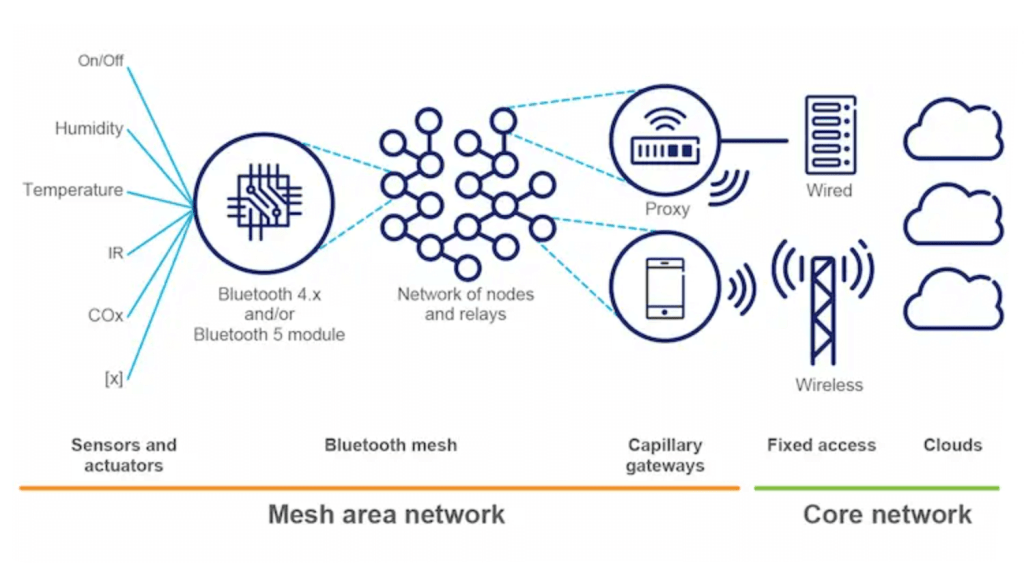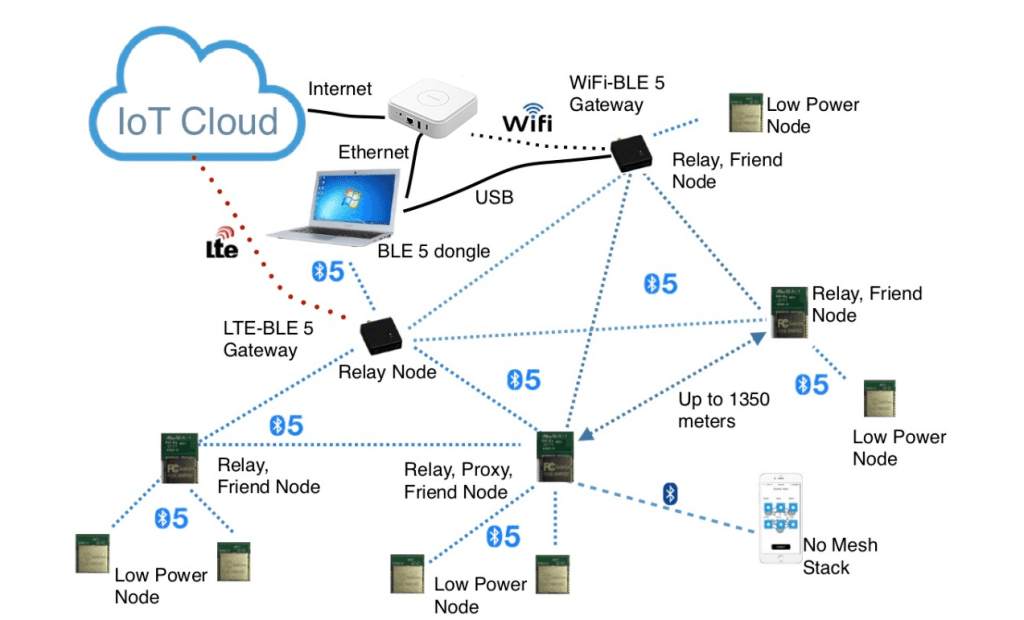

Bluetooth mesh gateway functions as a bridge between BLE mesh network and the sever, allowing non-IP BLE devices with the BLE mesh network to access the internet in order to implement remote control via user console App or Platform.
DusunIoT Bluetooth mesh (SIG) gateway support one-click onboarding of coniderable Bluetooth Mesh node devices, in a faster connection speed. Meanwhile, FOTA (firmware over the air) is supported.

The bluetooth mesh gateway solution contains two critical parts, the Bluetooth Gateway and various end BLE Mesh devices. DSGW-210 BLE gateway is the primary options for IoT-based BLE mesh network solution. DSGW-210 gateway hardware support both BLE Mesh protocols and edge computing functions. It provides reliable connectivity for a wide range of wireless IoT devices. The gateway’s modular architecture allows users to add or remove any connector they want or not necessary, leaving maximum customization of gateway features. Meanwhile, it is also an off-the-shelf solution that you can directly port your application on it.
CPU: RK3328 Quad-core CortexA53
OS: Linux RAM: Up to 1GB
protocols: Wi-Fi 2.4G/5G, Bluetooth 5.2, Zigbee 3.0, Z-Wave, LoRa, LTE CatM1, LTE Cat1, LTE Cat4, GPS, Matter & Thread
CPU: MT7628AN (600MHz)
OS: OpenWrt
RAM: Up to 128MB
protocols: Wi-Fi 2.4G/5G, Bluetooth 5.2, Zigbee 3.0, Z-Wave
CPU: MT7620A OS: OpenWrt
RAM: Up to 128MB
protocols: Wi-Fi 2.4G/5G, Bluetooth 5.2, Zigbee 3.0, LTE CatM1, GPS
CPU: ESP32
OS: OpenWrt
RAM: Up to 128MB
protocols: Wi-Fi 2.4G/5G, Bluetooth 5.2, Zigbee 3.0, Z-Wave
Relaying messages relies on the nodes in a Bluetooth mesh network to strengthen the connection. A BLE mesh network can contain a maximum of 32767 nodes. However, because Bluetooth LE cannot communicate directly with TCP/IP, which means BLE mesh devices cannot directly access the internet.
Therefore, a BLE mesh gateway is required to connect Bluetooth mesh devices—which collect environmental data—to the server, which runs cloud-enabled software and carries out data management tasks like data collection, processing, saving, notice, and publishing. The server then sends commands back to the BLE end devices via the gateway. Bridging is another name for this process, which involves two-way communication between BLE devices and the server through BLE mesh gateway.

Bluetooth Low Energy Mesh became accessible in the 2017 summer. In order to strengthen its its position of supremacy in wireless technology (as opposed to Zigbee, Z-wave, and LoRaWAN, etc.), Bluetooth Low Energy has chosen a new topology (many to many).
Many-to-many (m:m) device communications over Bluetooth radio are made possible by BLE mesh networks. As a result, one BLE device can use mesh nodes to connect with numerous other mesh devices that are part of the same network.
The nodes in the Bluetooth Mesh network are what relay the messages. A Bluetooth mesh network can include a maximum of 32767 nodes. In other words, devices can transmit data to other devices even if they are not directly inside the original device’s radio range (approx. 10 mter). BLE Mesh networks can therefore accommodate tens, hundreds, or even thousands of devices and span a wide variety of physical regions. As a result, extensive-node networks are fundamentally created, which can be applied to numerous IoT applications.

From the low-level physical radio layer to the high-level application layer, Bluetooth mesh is a full-stack solution with feasiblity to design products more easily and speedily and with higher levels of interoperability.


If you choose to use individual device addressing in wireless networks with heavy multicast traffic, it will negatively impact the network scalability and performance. BLE mesh includes a special publish/subscribe addressing mechanism for multicast traffic in light of this. Sending a message is the act of publishing. A setup known as “subscribing” enables selected messages to be forwarded to particular addresses for processing. Based on this, systems can achieve much greater scale, dependability, and performance while incurring lower costs thanks to the decentralized control approach.
Messages must be relayed by other network nodes when the source and destination nodes are not in close proximity to one another. However, without taking into account the best routes, the worst case scenario will be to send a massive amount of messages through the network . Bluetooth mesh uses a managed flood message relay system to drastically reduce messaging load on the network in order to solve this problem.


Power-restricted nodes make friendship with proxy nodes in order to participate in a mesh network. A low-power node usually need to conserve energy because it generally has a meager power supply (typically battery-powered). By caching messages, a live-powered node known as the friend node, acting as a proxy, prolongs the LPN’s slumber. After polling the friend node to get the stored messages, the LPN wakes up and broadcasts any messages it needs to the mesh network.
The BLE mesh network and the server are connected by a Bluetooth mesh gateway, which enables non-IP BLE devices to access the internet and implement remote control through the user console App or Platform.
The Bluetooth mesh gateway is a bridge allowing 2-way communication between Bluetooth mesh devices and the internet. By using BLE mesh gateway, users can control their BLE end devices individually or in groups on mobiile APPs.
A BLE gateway is an IoT gateway using BLE (Bluetooth Low Energy) technology. It is a wireless communication standard for short-range, ultra-low-power personal area networks that operate in the unlicensed 2.4GHz ISM band and was first published as part of the Bluetooth 4.0 core specification in 2010.
Talking about compatibility is a necessity while discussing Bluetooth. Bluetooth Classic uses a lot of power and is frequently used for speakers and headsets to transfer files. On the other hand, it cannot be operated effectively with a standard coin-cell battery. BL is incompatible and designed for low-bandwidth IoT applications.
A Bluetooth mesh network may contain up to 32,767 nodes, 4,096 subnets, and 65,535 scenes at any given time.
Yes, it supports. In the summer of 2017, Bluetooth SIG released the Bluetooth Low Energy (BLE) specification, enabling many-to-many communication through Bluetooth LE. The standard is defined in a different set of specifications and is not a part of the Core Bluetooth standard. It incorporates many of the BLE concepts and expands upon them.
Only the advertising/scanning statuses of BLE devices are used by Bluetooth mesh. As a result, BLE mesh devices must communicate with one another by sending advertising packets, which the other devices detect through scanning. All BLE versions (dating back to Bluetooth version 4.0, which is the initial iteration of the Bluetooth
| Parameters | Bluetooth mesh | WiFi mesh |
| Specification | Published by Bluetooth SIG | Published by IEEE under 802.11s standard |
| Frequency | 2.4 GHz | 2.4 GHz and 5 GHz |
| Data Rate | 1 Mbps | 150 Mbps |
| Bandwidth | Narrower | Wider |
| Coverage range | 10 to 100 meters | 10 to 50 meters, as it depends on range of Access Point (AP) or router |
| Deployment | Easy Setup | Auto |
| Node or device types | Relay node, Low Power Node (LPN), Friend node, Proxy node | Mesh point, Mesh AP, Mesh Portal, Station (STA) |
| Delay or latency | Low | Moderate |
| Power consumption | Low due to LPN node used in the network | Higher than BLE mesh |
| Number of nodes | 32767 | 255 |
| Routing algorithm | Uses managed flooding technique which is not very efficient method as every message needs to traverse through the entire network of nodes. | Peer to peer, WiFi mesh uses routing algorithms which are Internet Protocol (IP) based and more efficient. 802.11s supports HWMP (Hybrid Wireless Mesh Protocol) and RA-OLSR routing protocols. HWMP is default protocol and RA-OLSR is optional to implement. |
| Cost | Low | High |
| Applications | Industrial IoT use cases such as lighting, automotive etc. It is not suitable for audio and video transmission. | Wireless LAN, internet, data, audio, video etc. The IoT applications include home automation, smart HVAC control, smart buildings etc. |
Similar distances between nodes exist in Zigbee and Bluetooth Mesh networks—between 10 and 100 meters, depending on the situation. Zigbee, however, can accommodate more nodes in a mesh. The maximum number of nodes for Bluetooth Mesh is 32,000, whereas the maximum number of nodes for Zigbee is 65,000.
Bluetooth and mesh technology both employ radio frequencies to wirelessly transmit data, but Bluetooth can only send information to up to two direct connections at once. Mesh links each member of the group together into a complex web.
The element address and relay feature of the Bluetooth LE node should be enabled when creating a Bluetooth mesh profile configuration object. Create a Bluetooth LE node, specifying the role as “broadcaster-observer”. Indicate the relay node’s location. Give the relay node the configuration for the mesh profile.
By Applications
By Cloud Platforms
| Cookie | Duration | Description |
|---|---|---|
| cookielawinfo-checkbox-analytics | 11 months | This cookie is set by GDPR Cookie Consent plugin. The cookie is used to store the user consent for the cookies in the category "Analytics". |
| cookielawinfo-checkbox-functional | 11 months | The cookie is set by GDPR cookie consent to record the user consent for the cookies in the category "Functional". |
| cookielawinfo-checkbox-necessary | 11 months | This cookie is set by GDPR Cookie Consent plugin. The cookies is used to store the user consent for the cookies in the category "Necessary". |
| cookielawinfo-checkbox-others | 11 months | This cookie is set by GDPR Cookie Consent plugin. The cookie is used to store the user consent for the cookies in the category "Other. |
| cookielawinfo-checkbox-performance | 11 months | This cookie is set by GDPR Cookie Consent plugin. The cookie is used to store the user consent for the cookies in the category "Performance". |
| viewed_cookie_policy | 11 months | The cookie is set by the GDPR Cookie Consent plugin and is used to store whether or not user has consented to the use of cookies. It does not store any personal data. |

